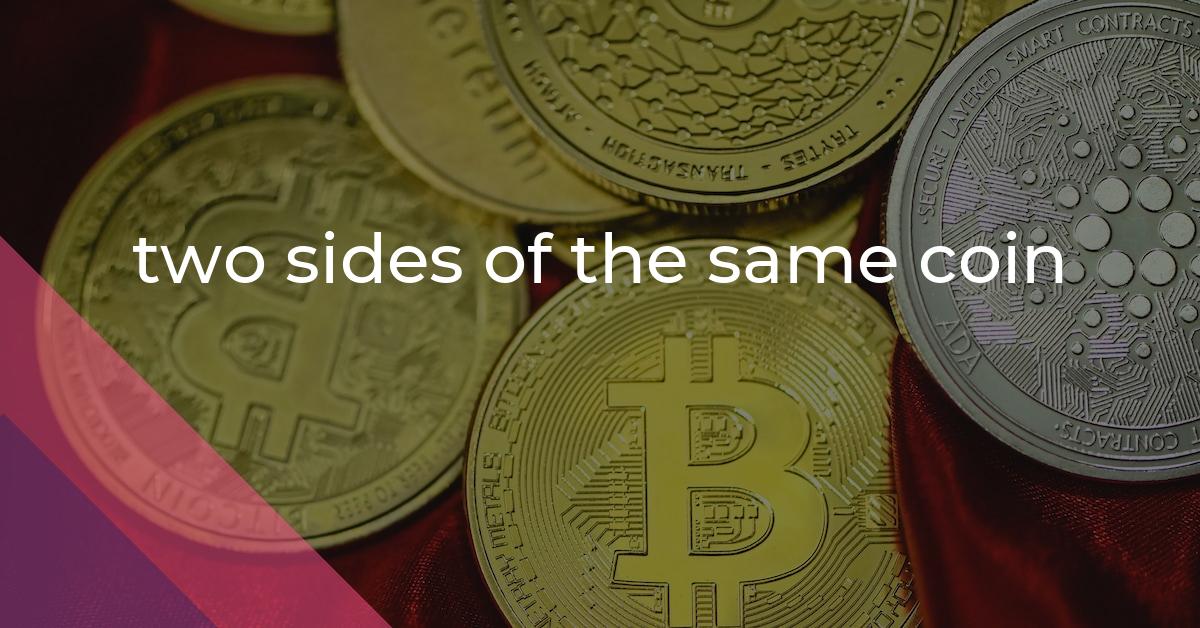two sides of the same coin: Idiom Meaning and Origin
What does ‘two sides of the same coin’ mean?
The idiom "two sides of the same coin" means that two things appear different, but are actually closely related or connected.

Idiom Explorer
The idiom "take sides" means to choose or support one person, group, or opinion over another, often in a conflict or disagreement.
The idiom "six of one, half a dozen of the other" means that two choices or options are essentially the same in outcome or value.
The idiom "same difference" is used to express the idea that two things may seem different but are actually quite similar or have no significant difference.
The idiom "other side" refers to a different perspective, viewpoint, or position on a particular matter or issue. It implies considering alternate opinions or taking into account different aspects of a situation.
The idiom "on the same page" means to be in agreement or understanding about something.
The idiom "on the other side of" is used to refer to a different viewpoint, perspective, or situation than the one currently being discussed or considered.
The idiom "on opposite sides of the barricades" means to have conflicting opinions, beliefs, or positions in a particular situation or issue.
The idiom "one side" means to support or favor one person or group over another, often causing a lack of fairness or impartiality in a situation.
The idiom *one and the same* means that two or more things or people are identical or indistinguishable from each other.
Dual Perspectives
The idiom "two sides of the same coin" is a commonly used phrase that highlights the close relationship or interconnectedness between two seemingly different or opposite things or people. This idiom is often used to emphasize that two ideas or perspectives, which may appear contradictory at first glance, are actually part of the same whole.
This concept can be related to the idiom "cut both ways", which means that a particular action or decision can have both positive and negative consequences. These two idioms share the idea that there are multiple facets or aspects to consider when evaluating a situation or making a judgement. Just as two sides of the same coin cannot be separated, the consequences of an action cannot be seen in isolation.
one and the same is another idiom that aligns with the notion of "two sides of the same coin". It suggests that two things are so closely related or identical that they are essentially indistinguishable. In other words, they are essentially the same thing, despite appearing different on the surface. This emphasizes the interconnectedness and inseparability of the two parts, just like the two sides of a coin.
Similarly, the idiom "same difference" reflects the idea that two things may seem different, but the end result or outcome is ultimately the same. This can be related to the concept of "two sides of the same coin", as both emphasize that there are underlying similarities or commonalities between seemingly opposing ideas or perspectives.
On the other hand, the idiom "couldn't be more different" represents the idea that two things are extremely distinct or dissimilar. While this idiom might initially seem contradictory to the concept of "two sides of the same coin", it can actually highlight the contrasting aspects of a larger whole. Just as a coin has two distinct sides, two ideas or perspectives can be vastly different while still being part of a broader concept or framework.
The idiom "two sides of the same coin" is frequently used in conversations, literature, and media to emphasize the interconnectedness or interdependence of seemingly contrasting notions. For example, it can be used to illustrate how two individuals with different personalities or perspectives may still share fundamental similarities. Similarly, it can highlight the interrelatedness of positive and negative aspects of a situation, or emphasize that two conflicting ideas are part of a broader, more complex truth.
This idiom relies on metaphorical language to convey its meaning. The coin serves as a metaphor for a concept or situation that has two distinct sides, just like a coin has two faces. The idiom suggests that these two sides are inseparable and cannot be fully understood or appreciated when considered in isolation.
It is important to note that the idiom "two sides of the same coin" is a fixed expression. Its meaning cannot be deduced solely by examining its individual words. Instead, its meaning is derived from the collective understanding of the phrase acquired through its repeated usage in specific contexts.
The idiom "two sides of the same coin" encapsulates the idea that two seemingly different or opposing things are interconnected or interdependent. Although its origin is believed to be ancient, its exact genesis in the English language remains uncertain. The phrase is metaphorical in nature and is commonly used to illustrate the complementary nature of two concepts or the interrelatedness of opposing ideas. By considering both sides, we gain a fuller understanding and appreciation of the complex nature of the whole, just as we do when examining a coin from both of its faces.
Example usage
Examples of how the idiom "two sides of the same coin" can be used in a sentence:
- Working hard and playing hard are two sides of the same coin.
- Love and hate are often seen as two sides of the same coin.
- Success and failure can be seen as two sides of the same coin.
More "Comparison" idioms



